GPC
Giant Papillary Conjunctivitis (GPC) is where conjunctiva (mucus membranes) in the upper lid are inflamed and the glands enlarge producing mucus and causing discomfort or itching. IT IS NOT CONTAGIOUS. It is not an infection. Protein coating and lipid deposits on soft lenses are a common cause of GPC. The use of disposable lenses has made GPC much less prevalent.
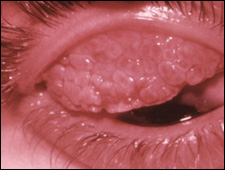
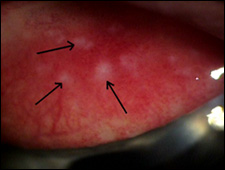
Giant bumps under the upper lid causes one not to be able to wear contact lenses comfortably. Photos SEC
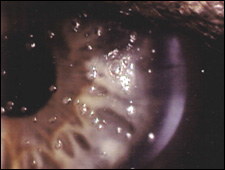 WHAT CAUSES GPC?
WHAT CAUSES GPC?
SYMPTOMS OF GPC
In the mild stage, reduced contact lens wearing time is the most common symptom. Many factors can affect comfortable wearing time, such as lack of sleep, environmental irritants, or dry eyes. However, persistent loss of wearing time, in the absence of identifiable reasons, may indicate an early stage of giant papillary conjunctivitis.
GPC - A major disappointment to contact lens wears
Giant papillary conjunctivitis can be a disappointing, discouraging condition since it is primarily caused by long-term use of contact lenses. Some contact lens wearers who have enjoyed wearing lenses for many years become intolerant and must either return to glasses, go to one day disposable lenses or have LASIK.
Preventative measures for Soft lense wearers:
- Good care of your lenses: cleaning, disinfecting, and soaking with solutions recommended by your eye care professional
- More frequent replacement of disposable lenses
- Change to daily disposable lenses
Preventative measures for gas-permeable lenses should include:
- Daily cleaning and disinfecting with recommeded solutions which may include periodic enzymatic cleaning at intervals recommended by the doctor
- Have your lenses polished at least 1x/yr
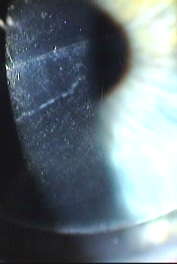
RGP lens fogging up.
TREATMENT:
Giant papillary conjunctivitis can usually be treated by discontinuing lens wear for at leasrt 30 days. Steroid eye drops for 2-4 wks are usually needed. It can usually be managed with the daily instillation olopatadine or a mast cell inhibitor, however GPC can becomes a chronic condition. The problem may reoccur when lens wear is resumed.
When eyes have recovered, resuming contact wear may fair better if worn on a more limited basis. A change in lens material may be beneficial in preventing recurrence. Simply replacing the old lenses with new ones is often helpful. Daily disposable lenses are by far the best option for those who experience problems. These are lenses that are worn for one day and then discarded.

Prescription drops are needed to treat GPC
GIANT PAPILLARY CONJUNCTIVITIS IS EASIER TO PREVENT THAN CURE
Even though we do not know exactly what causes giant papillary conjunctivitis, we do know that protein deposits are likely a contributing factor, so meticulous attention to cleaning is important. In addition, a well-fitted pair of contact lenses is essential to prevent problems such as giant papillary conjunctivitis.
CORNEAL ULCER / MISC.
- Depending on the cause, treatment will very often be using a combination of the therapies listed below.
- Do not use "Visine" or any other product to "get the red out," unless instructed by an eye care professional. These products many times mask a more severe underlying condition.
- If you have pain or light sensitivity by itself or with other symptoms, stop all contact lens wear immediately and call the office describing your symptoms. We will get you an appointment that day. You may have a CORNEAL ULCER, which can cause permanent scarring and reduction of vision.
SIGNS SYMPTOMS
- Pain, Redness, discharge, burning, tearing, pain, light sensitivity, eyes stuck together, swollen eyelids
TREATMENT
- Discontinue Contact lens wear
- Antibiotic drops
- Steroid drops
- Artificial Tears
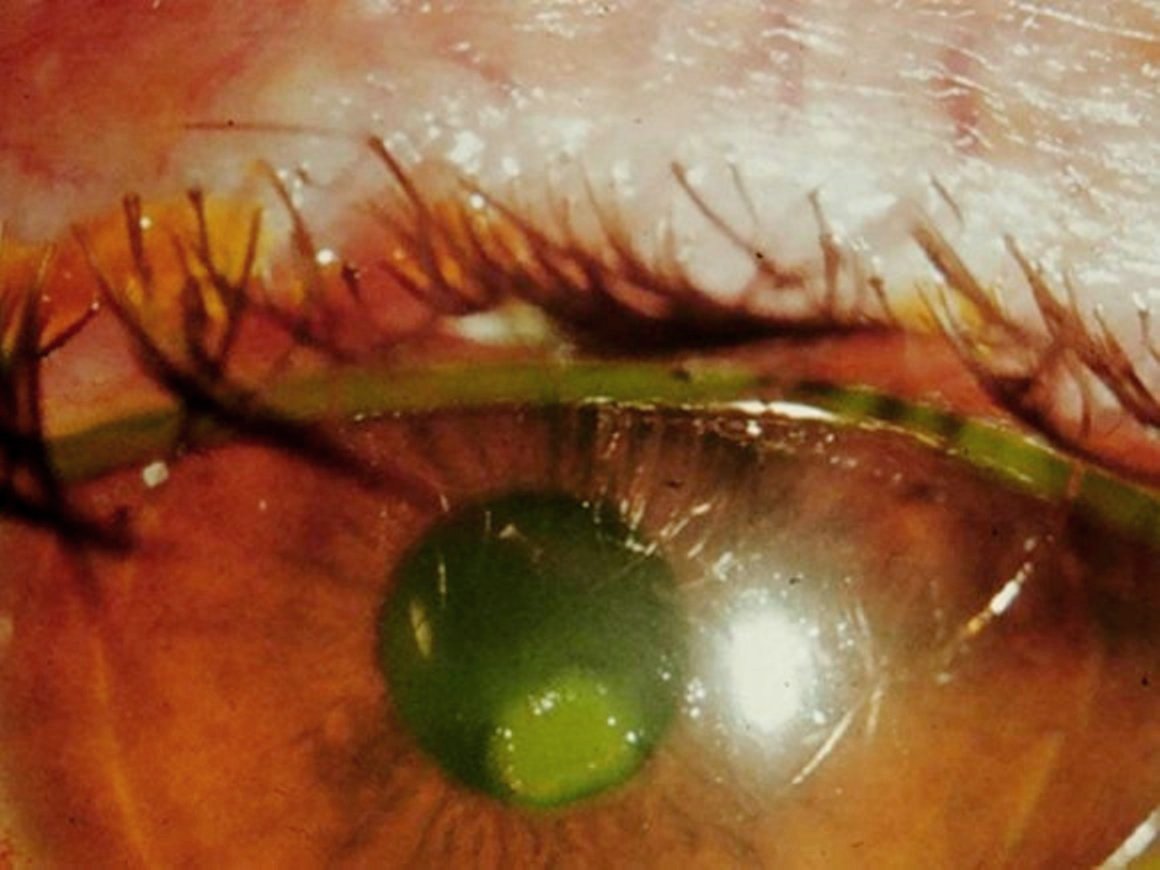
Active ulcer (green spot), being
self-treating with Visine.
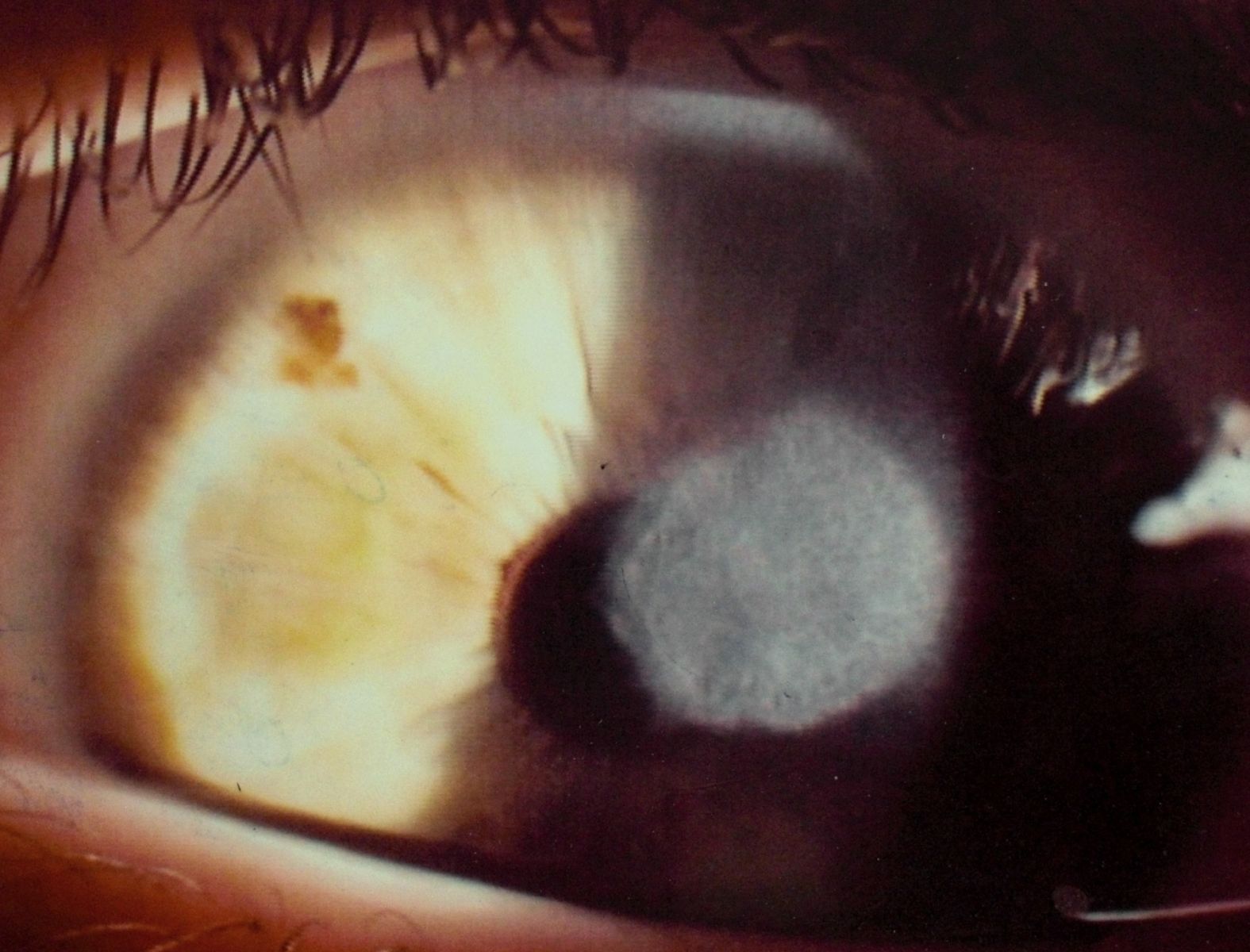
Scar from a severe corneal ulcer. The patient
needed to be hospitalized for three
days in order to save the eye.

